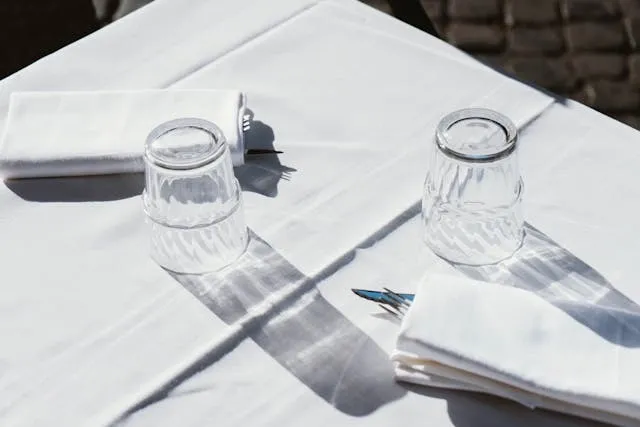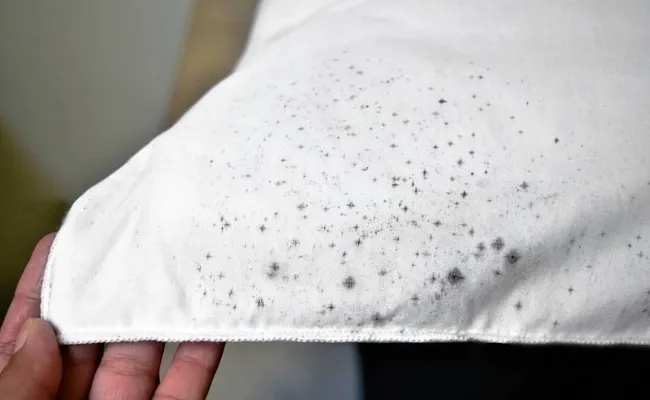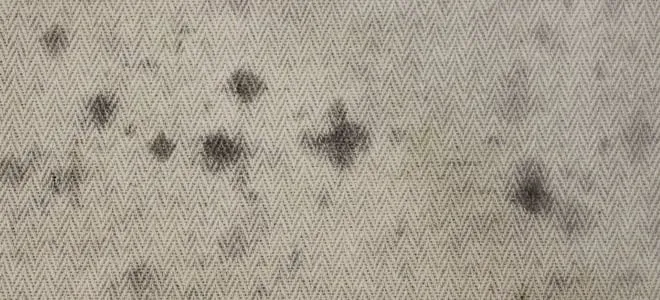How To Get Mold Out Of Tablecloth: First Steps, Cleaning With Professional & Natural Remedies, After Care Wash
In this post, we look at some essential tips for how to get mold out of your tablecloth. Discover the initial steps for addressing the mold, some effective cleaning methods with professional treatments and natural remedies, and crucial aftercare tips to keep your tablecloth free from mold and looking its best.

Key Takeaways
- ItÔÇÖs important to tackle the problem quickly if you want to get mold out of tablecloths effectively. Early detection and immediate treatment are crucial.
- There are various effective approaches to cleaning mold, including professional products and natural cleaning remedies to tackle the mold.
- Prevention is the best approach. Proper storage, regular inspections, and good cleaning practices will prevent mold from developing on your tablecloths.
- We supply high-quality custom polyester tablecloths that can be tailored to your needs and are low-maintenance and resistant to stains from mold and other sources.
Table of contents
-
How To Get Mold Out Of Tablecloth
-
First Steps To Remove Mold From A Tablecloth
-
How To Get Mold Out Of White Tablecloths
-
How To Remove Dried Mold From Specific Material Tablecloths
-
How To Clean Mold Stains With Professional Products
-
After Care: How To Remove Mildew From Polyester Tablecloths
-
Which Natural Products Are Effective To Clean Mold?
How To Get Mold Out Of Tablecloth
Just like removing red wine from tablecloths, it is essential to tackle mold on tablecloths quickly due to the risks to the fabric and your health. Mold thrives in damp environments and often develops unnoticed on tablecloths that are not stored properly. Its presence causes unsightly marks and can even weaken fibers over time.
It is essential to learn how to get mildew out of tablecloths promptly to prevent irreversible damage to the tablecloth’s aesthetic and function. If you neglect to remove the mold quickly, it could spread to other fabrics or surfaces and pose respiratory hazards for anyone exposed to it.
Regular inspection and adequate storage can prevent mold growth. We will learn all about that, along with how to remove mold when it does appear, in this post.

Does Mold Usually Leave A Permanent Mark On Tablecloths?
Typically, mold on tablecloths leaves a permanent mark if you don’t address the problem quickly. It can leave behind visible discoloration even after multiple washes. The severity of the staining depends on factors like:
- The type of mold
- Duration of growth
- Fabric composition
Effective removal methods include using appropriate cleaners and treatments, and these can mitigate stains. However, prevention through proper storage and maintenance is the best approach to guarantee no mold stains. If mold does develop, spot it and act quickly to ensure your custom printed tablecloths remain pristine for future use.
First Steps To Remove Mold From A Tablecloth
The first steps to remove mold from a tablecloth are all about tackling the issue quickly to prevent it getting worse. Here’s what to do:
- Take the tablecloth outdoors so that no spores are spread inside.
- Brush off loose mold spores gently with a dry cloth or soft-bristled brush.
- Pre-treat the area with your chosen solution (more on this later) to loosen stains and inhibit mold growth.
- Allow the solution to sit for several minutes before scrubbing gently with a soft brush or cloth.
- Rinse thoroughly with cold water.
This approach should work for mild stains, but you may need to do so more to tackle stubborn ones. Always launder the tablecloth afterwards in line with the care instructions to completely remove the mold.
Reduce the risk of mold with custom waterproof tablecloths
Our tablecloths made from waterproof materials allow for custom designs and their water-resistant construction makes them less likely to develop mold than other tablecloth materials.
How To Get Mold Out Of White Tablecloths
You must act quickly to get mold out of white tablecloths, and handle with care to preserve their crisp appearance.The process is similar to that described above, in that you should brush away loose spores outdoors before pretreating the affected area with you chosen solution and allowing it to sit for a few minutes. After scrubbing and rinsing away, you will know if any lingering spores remain.
One advantage of white fabric for stubborn stains is that you may be able to use a diluted bleach solution. Follow manufacturer instructions to do this, and launder the tablecloth immediately afterwards with a bleach-based detergent if safe for the fabric. Oxygen-based bleach may be a gentler alternative - make sure you know how to wash your tablecloths safely. Air dry in sunlight afterwards to further aid the mold removal.
How To Remove Dried Mold From Specific Material Tablecloths
When it comes to tablecloth care, it can be challenging to address dry mold no matter the fabric. Tablecloths can be susceptible to mold growth whether they are made from:
- Cotton
- Linen
- Polyester
- Other materials
It takes a targeted approach to remove dried mold and preserve the fabric integrity. Each fabric type has its own demands to achieve optimal results, whether that means washing delicate fibers gently or using more robust treatments for durable fabrics.
An understanding of these nuances is crucial to get the best outcome when removing mildew from tablecloths so that they can remain a centerpiece of elegance for your dining.

How To Get Mold Out Of Linen And Cotton Tablecloths
To get mold out of linen and cotton tablecloths, you must take a careful yet effective approach that preserves the fabric’s quality. Here’s a possible solution:
- Brush off loose mold spores outdoors.
- Soak the tablecloth in warm water and white vinegar for about an hour to break the mold down.
- Wash the table cover in the washing machine with a gentle detergent, adding a cup of baking soda for extra mold-fighting powder.
- If the stain persists, apply a mixture of lemon juice and salt directly to the mold spots and leave in direct sunlight to bleach naturally.
Once this is done, ensure the tablecloth is completely dry before storing it to prevent reoccurrence of the mold.
How To Get Mildew Out Of Polyester Tablecloths
There are several straightforward steps for how to remove mold from polyester tablecloths.
- Take the tablecloth outside to brush off loose mold spores.
- Create a solution of equal parts warm water and white vinegar, then apply that mixture to a cloth to blot the moldy areas.
- Let the solution sit for 15 minutes before rinsing away with cold water.
- Prepare a second solution of oxygen bleach following the product instructions, then soak the tablecloth for 30 minutes.
- Wash the tablecloth in the washing machine with mild detergent on a gentle cycle.
- Hang the tablecloth to air dry completely in direct sunlight to eliminate remaining mold.
If you get cheap polyester tablecloths in bulk, this method can address mold effectively.
Need a tablecloth suitable for outdoor use?
Our custom outdoor tablecloths are suitable for use in wet and windy environments and are less likely to absorb moisture and develop mold, even with frequent use.
Customize yours hereHow To Clean Mold Stains With Professional Products
If you want to get mold out of tablecloths using professional products, you will need to select an appropriate mold and mildew remover. Here’s how it works:
- Spray or apply the product onto the affected area directly.
- Let it sit for the recommended time - usually 10-15 minutes.
- Scrub the stain with a soft brush or cloth to lift the mold.
- Launder the tablecloth in hot water with heavy-duty detergent. Add a cup of white vinegar for even stronger cleaning.
- Rinse thoroughly and inspect for any remaining stains.
- If necessary, repeat the process before drying.
Most professional products include detailed instructions on how to get the best possible results.
After Care: How To Remove Mildew From Polyester Tablecloths
After carrying out the process to remove mildew from a polyester tablecloth, proper aftercare is important to maintain their current condition for the long term. First, follow the correct process for how to wash a polyester tablecloth and make sure it is completely dry.
Moisture is the biggest enemy when it comes to mold and mildew. Once you have established that your cover is completely dry, you should store it in a cool, dry place away from humidity. Keep it in a breathable storage bag rather than a plastic one, so that air can circulate. Check back and inspect the tablecloth regularly when not in use to avoid mildew buildup.
If there is any lingering mildew odor, a light spray of fabric refresher or a few hours in the sunlight should eliminate it.
Caring For Your Tablecloth After Removal
Once you have removed mold from your tablecloth, you should rinse it thoroughly with cold water ro get rid of any remaining cleaning solution. Air drying is best after this, and doing it in direct sunlight could help kill any lingering mold spores. We recommend that you avoid the tumble dryer as heat could set any residual staining.
Once the tablecloth is dry, iron it on a low setting to remove any wrinkles and ensure there are no mold spores remaining. Give the tablecloth a quick inspection, looking for any spots you may have missed, and re-treat if needed.
Finally, understand how to store tablecloths properly. A dry, well-ventilated space is best, and you could add some silica gel packets to absorb moisture. It’s important to check the stored tablecloth regularly for signs of dampness.
Does Temperature Affect The Mold Removal Process?
Temperature has a significant impact on the mold removal process. Firstly, warm water is likely to be more effective at dissolving the cleaning agents to make them more effective at breaking down spores. Also, high temperatures can kill some species of mold, so hot water is often more effective for washing moldy fabrics.
Cold temperatures may slow mold growth but won’t usually remove or kill the spores. Sunlight exposure can be helpful in eliminating lingering mold. It’s important to understand, however, that excessive heat might set stains or damage certain fabrics. So you should use an appropriate washing temperature and avoid the tumble dryer if possible.
Enjoy a custom design in a mold-resistant fabric
Our custom printed tablecloths are made from polyester which doesn’t develop mold easily. You have complete design control and they are easy to maintain long-term.
Which Natural Products Are Effective To Clean Mold?
Some natural products can be useful for cleaning mold due to their acidic or abrasive properties. Some good options for this include:
- Vinegar
- Baking soda
- Lemon juice
By breaking down spores and lifting stains, these can make mold easier to remove.
Some natural substances also possess antifungal properties, killing mold and preventing its regrowth. You can use them to gently scrub away mold and its stains without causing harm to the fabric. Using natural products is safe and eco-friendly as opposed to chemical cleaners, effectively removing mold with a much lower environmental impact.
Let’s take a look at some specific products that have been effective for cleaning our custom print-on-demand tablecloths.
Baking Soda And White Vinegar
Baking soda and white vinegar can combine effectively to tackle mold on tablecloths. Here’s how it works:
- Sprinkle baking soda generously over the affected area.
- Mix equal parts white vinegar and water in a spray bottle and spray over the stain and the baking soda.
- The mixture will fizz, breaking down the mold. Allow it to sit for 15-20 minutes.
- Gently scrub the area with a soft brush to lift the mold.
- Rinse thoroughly with warm water then launder the tablecloth as usual.
This combination combines the abrasive properties of baking soda with the acidic white vinegar to tackle the mold. You may need to repeat the process after the first application, but it can be very effective on common household forms of mold.
Lemon Juice And Salt
Lemon juice and salt are another great option to get mold out of tablecloths. The acid in the lemon juice will break down the spores, while the abrasive salt helps scrub away the stains.
- Sprinkle salt generously over the mold.
- Squeeze fresh lemon juice onto the salt.
- Allow the mixture to sit for 10-15 minutes, penetrating the fabric and breaking down the mold.
- Gently scrub the area with a soft brush or cloth.
- Rinse thoroughly with warm water and launder the tablecloth according to the care instructions.
This method is known to work well on surface mold. Not only will it help remove unsightly infestations and stains, but it will also leave a fresh, citrus scent.

Can Salt And Boiling Water Really Remove Mold?
Salt and boiling water may be an effective solution for removing mold from certain fabrics. The salt works as a natural abrasive and dehydrating agent, while the boiling water kills spores and inhibits growth. Together, they may enable you to scrub stains away.
- Dissolve salt in boiling water and apply to the affected area.
- The combination of heat and salt helps remove the stain and sanitize the fabric.
- Bear in mind that this is most effective on surface mold - it may not help with deeply ingrained or stubborn infestations.
You should also be mindful that more delicate fabrics may not be able to withstand the heat of the boiling water. Check the care label before choosing this method.
Frequently Asked Questions About How To Get Mold Out Of Tablecloth
How To Get Mold Out Of Tablecloth
There are various ways to get mold out of tablecloth using chemical cleaners or natural products. The basic method is to treat the stain with your chosen product before scrubbing, rinsing, and laundering.
Which Natural Products Are Effective To Clean Mold?
The acidic properties of white vinegar and lemon juice can break down mold, while natural abrasives like baking soda or salt may help scrub it and lift mold from the fabric. Combinations of these substances can work well.